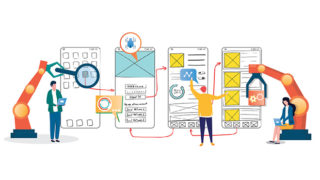Topic: automated testing
Still testing like it’s 1999?
Let’s flash back to New Year’s Eve 1999, when we were popping corks to celebrate the entrance of a new millennium and, as the ball dropped, that Y2K hadn’t descended us into the Dark Ages. All the while we were blissfully unaware that the dot.com bubble was about to burst (even though it was obvious … continue reading
How to solve your UI testing problems
Enterprises want to deliver software fast in order to keep up with market demands and stay competitive, but at the end of the day it doesn’t matter how fast they deliver software if it’s not pleasing to the end user. “Users are the ones who are going to be interacting with your application, so you … continue reading
Report: Manual testing practices continue to impede mainframe modernization
Test automation is a key to today’s business success, but businesses are failing to apply it everywhere. A recent report revealed only 75% of organizations don’t have test automation in place at every stage of development, and only 7% of organizations automate test on the mainframe. In addition, 82% of respondents don’t believe they will … continue reading
7 deadly mistakes to avoid while testing your mobile application
Mobile app testing is different from web application testing. Mobile app users seek a lot more than just app’s functionality, like sleek design, simple user experience, and speed. Due to a highly competitive market, users can find a better alternative to an existing app if they are not satisfied with it. Mobile app testing plays … continue reading
A guide to continuous testing tools
Mobile Labs: Mobile Labs remains the leading supplier of in-house mobile device clouds that connect remote, shared devices to Global 2000 mobile web, gaming, and app engineering teams. Its patented GigaFox is offered on-premises or hosted, and solves mobile device sharing and management challenges during development, debugging, manual testing, and automated testing. A pre-installed and … continue reading
How does your solution help organizations find success with continuous testing?
Eran Kinsbruner, mobile technical evangelist, Perfecto Perfecto has been playing in this space of software test automation and continuous testing for more than 12 years now, and we have seen so many different organizations of varied maturity levels struggling with continuous testing and just straight test automation. So what we’ve decided in the last year … continue reading
Testing all the time
Continuous testing marks the evolution of software testing to where it can keep up with the rapid pace of development, while adapting to new software architectures and development methodologies such as DevOps and Agile. Relying on automated test execution as a cornerstone, continuous testing is the embodiment of the “shift left” craze sweeping the industry. … continue reading
Tools of the continuous testing trade
Testing has always required tools to be effective. However, the tools continue to evolve with many of them becoming faster, more intelligent and easier to use. Continuous testing (CT) necessarily recognizes the importance of testing throughout the software delivery life cycle. However, given the rapid pace of CT, tests need to run in parallel with … continue reading
Who owns continuous testing?
Continuous testing (CT) has been the missing piece of the Continuous Integration/Continuous Delivery (CI/CD) movement, but that’s changing out of necessity. While organizations say they’re “delivering value to customers” at an ever-accelerating pace, customers may disagree with the definition of “value” when software quality doesn’t keep pace. In fact, software quality may actually decrease as … continue reading
Continuous testing at every step
Continuous integration (CI), continuous testing (CT) and continuous delivery (CD) should go hand-in-hand, but CT is still missing from the CI/CD workflow in most organizations. As a result, software teams eventually reach an impasse when they attempt to accelerate release cycles further with CI/CD. What they need to get to from both a mindset and … continue reading
premium The seismic shift in how we test software
As it’s been since ARPANET, functional web software today is mostly shipped by luck, duct tape, or sheer will. Ask any engineer with tenure at an ecommerce company and they can tell you about the last time they broke checkout, the defining feature of doing commerce online. Every year we have groundbreaking technologies that change … continue reading
Why continuous testing is so important
Organizations continue to modernize their software development and delivery practices to minimize the impact of business disruption and stay competitive. Many of them have adopted continuous integration (CI) and continuous delivery (CD), but continuous testing (CT) tends to be missing. When CT is absent, software delivery speed and code quality suffer. In short, CT is … continue reading














